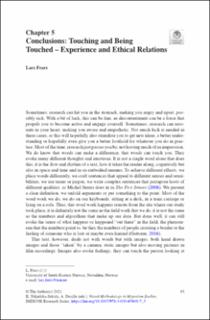Conclusions: Touching and being touched – Experience and ethical relations
Chapter
Published version
Permanent lenke
https://hdl.handle.net/11250/2772476Utgivelsesdato
2021Metadata
Vis full innførselSamlinger
Originalversjon
Frers, L. (2021). Conclusions: Touching and Being Touched – Experience and Ethical Relations. In K. Nikielska-Sekula & A. Desille (Eds.), Visual Methodology in Migration Studies: New Possibilities, Theoretical Implications, and Ethical Questions (pp. 85-95). Springer International Publishing. https://doi.org/10.1007/978-3-030-67608-7_5Sammendrag
Sometimes, research can hit you in the stomach, making you angry and upset, pos- sibly sick. With a bit of luck, this can be fine, as discontentment can be a force that propels you to become active and engage yourself. Sometimes, research can reso- nate in your heart, making you aware and empathetic. Not much luck is needed in these cases, as this will hopefully also stimulate you to get new ideas, a better under- standing or hopefully even give you a better foothold for whatever you do in prac- tice. Most of the time, research just passes you by, not leaving much of an impression. We do know that words can make a difference, that words can touch you. They evoke many different thoughts and emotions. It is not a single word alone that does this, it is the flow and rhythm of a text, how it takes the reader along, cognitively but also in space and time and in an embodied manner. To achieve different effects, we place words differently, we craft sentences that appeal to different senses and sensi- bilities, we use terms or jargon, we write complex sentences that juxtapose hosts of different qualities, as Michel Serres does in in The Five Senses (2008). We present a clear definition, we unfold arguments or put something to the point. Most of the word work we do, we do on our keyboards, sitting at a desk, in a train carriage or lying on a sofa. Thus, this word work happens remote from the site where our study took place, it is definitely not the same as the field work that we do, it is not the same as the numbers and algorithms that make up our data. But done well, it can still evoke the sense of what happens or happened “out there” in the field, the phenom- ena that the numbers point to, be they the numbers of people crossing a border or the feeling of someone who is lost or maybe even hunted (Guttorm, 2016).

